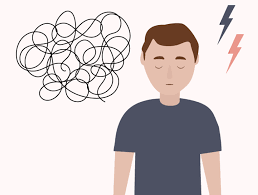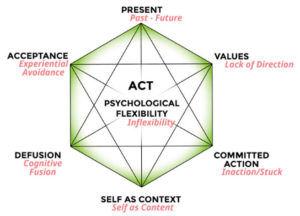OCD and anxiety are two of the most common mental health disorders in the world. They both cause a great deal of suffering for those who suffer from them, and it can be difficult to know how to cope with them. In this blog post, we will discuss the connection between OCD and anxiety, and we will provide some tips on how to manage these conditions.
Contents
Understanding OCD And Anxiety
 OCD and anxiety are two very different conditions, but they can often occur together. OCD is a disorder that is characterized by obsessions and compulsions, while anxiety is simply a feeling of worry or unease. However, when someone has both OCD and anxiety, the two conditions can feed off of each other and make the symptoms worse.
OCD and anxiety are two very different conditions, but they can often occur together. OCD is a disorder that is characterized by obsessions and compulsions, while anxiety is simply a feeling of worry or unease. However, when someone has both OCD and anxiety, the two conditions can feed off of each other and make the symptoms worse.
It is believed that OCD and anxiety often occur together because they share some common risk factors. For example, both conditions are more likely to develop in people who have a family history of mental illness. Additionally, OCD and anxiety can both be triggered by stress.
Studies have found that people with OCD are more likely to also have an anxiety disorder. It is estimated that up to 60% of people with OCD also suffer from an anxiety disorder. The most common type of anxiety disorder that occurs alongside OCD is generalized anxiety disorder (GAD).
While OCD and anxiety are two different conditions, they can often occur together. If you or someone you know is struggling with both OCD and anxiety, it is important to seek professional help. Treatment for both conditions can be very effective in reducing symptoms and improving quality of life.
How OCD And Anxiety Are Related?
Many people wonder how OCD and anxiety are related. The two conditions share many similarities, but there are also some key differences. Here’s what you need to know about the connection between OCD and anxiety.
Similarities
The similarities between OCD and anxiety are often what lead people to believe that they are the same condition. Both OCD and anxiety can cause:
- Intrusive thoughts: This is when you have a thought that pops into your head and won’t go away. It can be a worry about something bad happening or a repetitive thought that you can’t shake.
- Avoidance: This is when you start avoiding things that trigger your intrusive thoughts. For example, if you have a fear of dirt and germs, you may start avoiding places where there is a chance of getting dirty.
- Anxiety: This is the feeling of nervousness, worry, or fear. It can be mild, moderate, or severe. For example, you may feel anxious about an upcoming test or presentation.
- Ritualistic behaviors: People with OCD and anxiety may develop rituals or compulsions to try to relieve their anxiety. For example, you may wash your hands over and over again or check the locks on your doors multiple times.
- Tension and worry: In this, people with OCD or anxiety may feel like they are constantly on edge. They may have a hard time relaxing or sleeping.
- Sleep problems: This seems to be a common symptom for both conditions. People with OCD or anxiety may have trouble falling asleep or staying asleep.
Differences
There are also some key differences between OCD and anxiety. It is important to know these differences so that you can get the right diagnosis and treatment.
OCD is characterized by:
- Obsessions: This is when you have intrusive thoughts that are recurrent and persistent. You may try to ignore or suppress these thoughts, but they won’t go away.
- Compulsions: This is when you have repetitive behaviors that you feel like you need to do in order to relieve your anxiety. For example, people with OCD may wash their hands over and over again or check the locks on their doors multiple times.
Anxiety is characterized by:
- Fear: This is the main symptom of anxiety. People with anxiety may feel fear about a specific event or situation, such as public speaking or flying.
- Avoidance: It is common for people with anxiety to avoid the things that trigger their fear. For example, someone with a fear of flying may avoid airplanes.
- Panic attacks: This is when people with anxiety have sudden and intense episodes of fear. They may have a racing heart, shortness of breath, and sweating.
So these are some common similarities and differences between OCD and anxiety. People should know that both conditions are treatable. If you think you may have OCD or anxiety, please see a mental health professional for an evaluation.
Can OCD Be Mistaken For Anxiety?
 As OCD and anxiety can be so intertwined, it’s not uncommon for OCD to be mistaken for anxiety – or vice versa. Many people who live with OCD experience anxiety, and many people with anxiety develop OCD-like symptoms. It’s important to remember that everyone experiences these disorders differently, so don’t compare your experience to someone else’s.
As OCD and anxiety can be so intertwined, it’s not uncommon for OCD to be mistaken for anxiety – or vice versa. Many people who live with OCD experience anxiety, and many people with anxiety develop OCD-like symptoms. It’s important to remember that everyone experiences these disorders differently, so don’t compare your experience to someone else’s.
However, the symptoms and signs might be more obvious in one disorder than in the other. For example, if you’re fixated on a certain fear or worry with OCD, it might be difficult to function in your day-to-day life. With anxiety, you might experience symptoms like this occasionally, but they don’t typically interfere with your ability to live a normal life.
If you think you might have OCD, it’s important to seek professional help. A therapist who specializes in OCD can help you develop a treatment plan that works for you. If you live with anxiety, there are also many effective treatments available. Don’t hesitate to reach out for help if you’re struggling.
Can OCD Tendencies Causes Anxiety?
Although it seems that having OCD tendencies might cause anxiety, researchers are still trying to figure out the connection between the two. Some scientists believe that people with OCD are more likely to have anxiety because of their need for control. Others believe that people with anxiety are more likely to develop OCD because they worry about things that they can’t control.
Moreover, one study has suggested that people with OCD are more likely to have anxiety because they tend to catastrophize their thoughts. Catastrophizing is when you make a situation seem much worse than it actually is. For example, if you’re worried about getting a disease, you might think that you’re going to die from it.
Overall, even though the connection between OCD and anxiety is not fully understood, it’s important to remember that you can have both disorders. If you think you might have OCD, don’t hesitate to talk to a mental health professional. They can help you get the treatment you need.
Treatment For OCD And Anxiety
There are many effective treatments for OCD and anxiety. And in fact, the treatment options can be used commonly for both conditions. The most common treatment options include:
Therapy
This is one of the most effective treatments for OCD and anxiety. Some of the options are:
Exposure and response prevention (ERP)
ERP is a type of cognitive-behavioral therapy that involves gradually exposing yourself to your fears and learning to respond to them differently. It aims at changing your reaction to your obsessions and compulsions. For example, in ERP a therapist would help you to gradually approach the things you’re afraid of and then teach you how to deal with the anxiety that comes with it.
Cognitive behavioral therapy (CBT)
CBT is a type of psychotherapy that helps you change your thinking and behavior. It can be used to treat a wide range of mental health conditions, including OCD and anxiety. This is achieved by teaching you how to identify and change negative thoughts and behaviors. Also, CBT works to help you develop coping skills to deal with stressful situations.
Mindfulness-based cognitive therapy
This is one of the newer types of therapy that’s being used to treat OCD and anxiety. It combines elements of CBT with mindfulness techniques. Mindfulness is a form of meditation that involves paying attention to your thoughts, feelings, and sensations in the present moment without judgment. The goal of mindfulness-based cognitive therapy is to help you become more aware of your thoughts and feelings so that you can learn to control them.
Acceptance and Commitment Therapy
 Acceptance and Commitment Therapy, or ACT, is about accepting that your thoughts and feelings are normal for someone with OCD or anxiety. This may seem counterintuitive, but it’s important to remember that your thoughts are not reality. They’re just thoughts. And while they may be intense and scary, they’re not going to hurt you. So ACT can be a helpful way to learn how to deal with your thoughts and feelings without letting them control you.
Acceptance and Commitment Therapy, or ACT, is about accepting that your thoughts and feelings are normal for someone with OCD or anxiety. This may seem counterintuitive, but it’s important to remember that your thoughts are not reality. They’re just thoughts. And while they may be intense and scary, they’re not going to hurt you. So ACT can be a helpful way to learn how to deal with your thoughts and feelings without letting them control you.
So these are some of the common therapy types that are helpful for OCD and anxiety. If you’re struggling with either of these conditions or both, know that you’re not alone and there is help available.
Medication
It is important to note that there are different types of anxiety disorders, and not all of them require medication. However, for those who do suffer from conditions like OCD, medication can be a lifesaver. There are a variety of different medications that can be used to treat OCD, and the best one for each individual will vary depending on the severity of their symptoms. Some common medications used to treat OCD include:
- Selective serotonin reuptake inhibitors (SSRIs)
- Tricyclic antidepressants (TCAs)
- Monoamine oxidase inhibitors (MAOIs)
SSRIs are the most commonly prescribed type of medication for OCD, and they work by increasing the levels of serotonin in the brain. This can help to reduce anxiety and improve mood. However, all medications are associated with potential side effects, so it is important to discuss any medications you are considering taking with your doctor.
Support groups
This is one type of treatment that can be beneficial for people with OCD and anxiety. In a support group, you can share your experiences with others who understand what you’re going through. This can help you feel less alone and provide you with valuable support and advice.
If you’re interested in finding a support group, there are many resources available online. Also, it is important to understand that support groups are available in many different formats, so you can find one that meets your needs. Some groups are led by professionals while others are more informal. You should also keep in mind that some groups may require you to pay a fee while others are free of charge.
These are some professional treatment options for OCD and anxiety. You should always consult with a mental health professional to find the best treatment option for you.
Is It Possible To Self-Manage OCD And anxiety?
While it may be possible to manage OCD and anxiety on your own, it is important to remember that everyone is different. Some people may need medication or therapy to cope with their symptoms. Others may find that they can manage this with self-help techniques.
So, there is no definite answer to whether you can self-manage or not. But, if you feel like you can, here are a few things you can try. These include:
Identifying your triggers
What sets off your OCD or anxiety? Once you know what these are, you can start to avoid them. Also, your triggers may change over time, so it’s important to keep monitoring them. Triggers are different for everyone, so what works for one person may not work for another. Even so, the triggers are different from the symptoms. So, if you can identify and avoid your triggers, you may be able to reduce your symptoms.
Challenging your thoughts
People with OCD often have intrusive and negative thoughts. These can be about anything, such as contamination or harm. While it may be difficult, try to challenge these thoughts. For example, is there evidence that what you’re thinking is true? Are you overthinking the situation? This can help to reduce your anxiety and OCD symptoms.
Practice meditation
This is one of the most effective treatments for OCD and anxiety. Meditation helps you focus on the present moment, which can be very helpful if you’re constantly worrying about the future. It also helps to calm and clear your mind, which can be helpful if you’re struggling with intrusive thoughts. If you’re new to meditation, there are many great resources available to help you get started.
Brush up on OCD facts
When dealing with OCD and anxiety is important to know the facts. OCD is an anxiety disorder that affects about two percent of the population. That’s about one in every forty-nine people. It usually begins in childhood or adolescence, but can start in adulthood. When you are aware of OCD facts and anxiety, you will more likely better understand how to deal with your anxiety.
Get active
Physical activity is a great way to combat these condition symptoms. Exercise releases endorphins, which have mood-boosting effects. It also helps to take your mind off of your worries and gives you a sense of accomplishment. So you should try getting active every day, even if it’s just a brisk walk around the block.
Keep a journal
 Journals can be a great way to track your thoughts and progress in regards to your OCD and anxiety. Writing down your worries, fears, and what sets off your OCD can help you to better understand your disorder and how to manage it. Additionally, journaling can be a form of self-care and can help to reduce stress. There are many different types of journals you can keep, so find one that works best for you. You may want to keep a daily journal where you write down your thoughts and feelings each day.
Journals can be a great way to track your thoughts and progress in regards to your OCD and anxiety. Writing down your worries, fears, and what sets off your OCD can help you to better understand your disorder and how to manage it. Additionally, journaling can be a form of self-care and can help to reduce stress. There are many different types of journals you can keep, so find one that works best for you. You may want to keep a daily journal where you write down your thoughts and feelings each day.
Cut back your compulsive behavior
This can be difficult but it’s worth it. The goal is to feel better and have more control over your life. Reducing compulsions will help reduce anxiety in the long run. Start by slowly cutting back on the time you spend engaging in compulsions. If you typically spend an hour a day washing your hands, try to cut back to 30 minutes. Then 20 minutes. And so on. You may need to experiment to find the right balance for you.
Overall, these are a few tips to manage OCD and anxiety. It’s important to find what works for you and stick with it. These tips may not work for everyone, but they’re a good place to start. If you’re struggling, don’t hesitate to reach out to a mental health professional for help.
Conclusion
So there you have it, the connection between OCD and anxiety. Both are simply defined as disorders that can cause excessive worry and stress, but there are key differences between the two. OCD is characterized by intrusive thoughts, compulsions, and rituals while anxiety is more general worry and fear. However, both disorders can be treated with therapy and medication.
It is important to understand the connection between the two conditions because they are both very common disorders that can have a major impact on your life. If you or someone you know is struggling with either of these disorders, please seek professional help.
You can also contact Therapy Mantra for more information and resources. We have a team of professional therapists who can provide you with the support and guidance you need to recover from this condition. Contact us today to learn more about our services. You can also book an online therapy or download our free OCD treatment app on Android or iOS.


